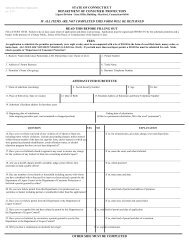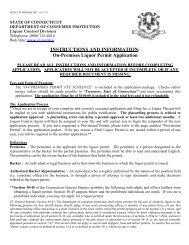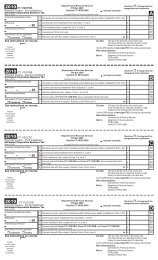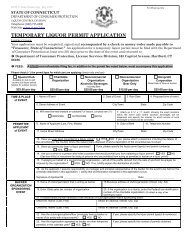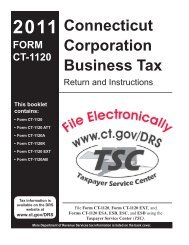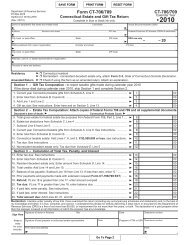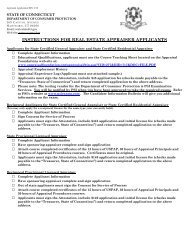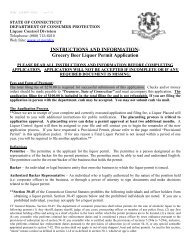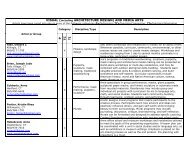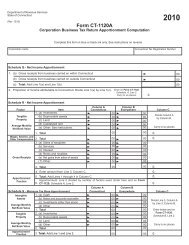CT-1041 booklet, Connecticut Income Tax Return for Trusts and ...
CT-1041 booklet, Connecticut Income Tax Return for Trusts and ...
CT-1041 booklet, Connecticut Income Tax Return for Trusts and ...
You also want an ePaper? Increase the reach of your titles
YUMPU automatically turns print PDFs into web optimized ePapers that Google loves.
DefinitionsFor <strong>Connecticut</strong> income tax purposes, an estate is eithera resident estate or a nonresident estate. A trust is either aresident trust, nonresident trust, or part-year resident trust. Theresidence of the fiduciary or the beneficiary does not affectthe status of a trust or estate as resident or nonresident.Fiduciary applies to a person who occupies a position ofspecial confidence toward others, such as a trustee, executor,or administrator. A fiduciary is a person who holds in trustproperty in which another person has a beneficial interest orwho receives <strong>and</strong> controls the income of another.Any reference to “you” in this <strong>booklet</strong> refers to the fiduciary.Resident estate is where a decedent was a resident of<strong>Connecticut</strong> at the time of his or her death. A resident estatealso includes a bankruptcy estate of an individual who at thebeginning of the bankruptcy case is a <strong>Connecticut</strong> resident.Nonresident estate is an estate that is not a resident estate <strong>for</strong>any part of the year.Trust means an arrangement ordinarily created either by awill or by an inter vivos declaration where a trustee or trusteestake title to property to protect or conserve it <strong>for</strong> beneficiaries<strong>and</strong> classified <strong>and</strong> treated as a trust <strong>for</strong> federal income taxpurposes.Testamentary trust is a trust or portion of a trust created bythe will of a decedent.Inter vivos trust is a trust created other than by the will of adecedent.Electing small business trust (ESBT) has the same meaningas <strong>for</strong> federal income tax purposes.Resident trust means:• A testamentary trust or a portion of the trust if the decedentwas a resident individual at the time of death.• An inter vivos trust or a portion of the trust consisting ofthe property of: 1) a person who was a resident of this stateat the time the property was transferred to the trust if thetrust was then irrevocable; 2) a person who, if the trust wasrevocable at the time the property was transferred to thetrust <strong>and</strong> has not subsequently become irrevocable, was aresident of this state at the time the property was transferredto the trust; or 3) a person who, if the trust was revocablewhen the property was transferred to the trust but the trusthas subsequently become irrevocable, was a resident of thisstate at the time the trust became irrevocable.For this purpose, a trust is revocable if it is subject to a power,exercisable immediately or at any future time, to revest title inthe person (the grantor) whose property constitutes the trust.A trust becomes irrevocable when the possibility that thepower may be exercised has ended.An irrevocable inter-vivos trust consisting of property of agrantor who is a resident of this state when the property wastransferred to the trust remains irrevocable <strong>and</strong> a resident trust.The criteria used to determine whether a decedent or grantor isa resident of this state, <strong>for</strong> <strong>Connecticut</strong> income tax purposes,are the same criteria used to determine whether an individualis a resident of this state.Nonresident trust is a trust that is not a resident trust <strong>for</strong> anypart of the year.Part-year resident trust is a trust that meets the definition ofresident trust or nonresident trust <strong>for</strong> only part of the year.Grantor trust is a legal trust under applicable state law thatis not recognized as a separate taxable entity <strong>for</strong> income taxpurposes because the grantor or other substantial ownershave not relinquished complete dominion <strong>and</strong> control overthe trust.<strong>Connecticut</strong> alternative minimum tax is a tax imposed oncertain individuals, trusts, <strong>and</strong> estates in addition to theirregular income tax. Fiduciaries who have a federal alternativeminimum tax liability are subject to the <strong>Connecticut</strong> alternativeminimum tax. The tax rate is the lesser of 19% of adjustedfederal tentative minimum tax or 5½% of adjusted federalalternative minimum taxable income. For in<strong>for</strong>mation on howto calculate the adjusted federal alternative minimum taxableincome of an inter vivos trust with one or more nonresident,noncontingent beneficiaries, see <strong>Connecticut</strong> <strong>Tax</strong>able <strong>Income</strong><strong>for</strong> Certain Inter Vivos <strong>Trusts</strong> on Page 7.The residency status of each beneficiary is determined as ofthe last day of the trust or estate’s taxable year.Distributable net income means distributable net income <strong>for</strong>federal income tax purposes.Noncontingent beneficiary is a beneficiary whose interestis not subject to a condition precedent <strong>and</strong> includes everyindividual to whom a trustee of an inter vivos trust duringthe taxable year: 1) is required to currently distribute incomeor corpus, or both; or 2) properly pays or credits income orcorpus, or both; or 3) may, in the trustee’s discretion, distributeincome or corpus, or both. Noncontingent beneficiary includesevery beneficiary to whom or to whose estate any of thetrust’s income <strong>for</strong> the taxable year must be distributed at aspecified future date or event <strong>and</strong> every beneficiary who hasthe unrestricted lifetime or testamentary power, exercisablecurrently or at some future specified date or event, to withdrawany of the trust’s income <strong>for</strong> the taxable year or to appoint theincome to any person including the estate of the beneficiary.This also applies to a noncontingent beneficiary which is atrust or an estate. Wherever reference is made to an individualwho is a noncontingent beneficiary, that reference includes atrust or estate that is a noncontingent beneficiary, but does notinclude a corporation that is a noncontingent beneficiary.Contingent beneficiary is an individual (or trust or estate)who is a beneficiary, but not a noncontingent beneficiary of aresident inter vivos trust.Page 5




